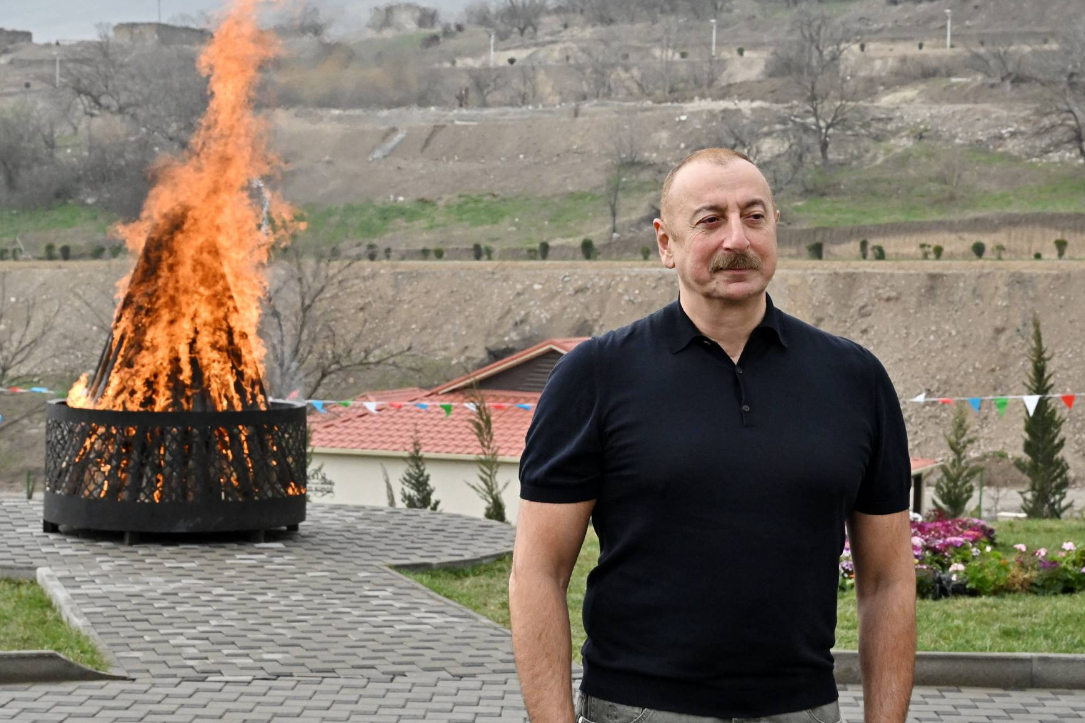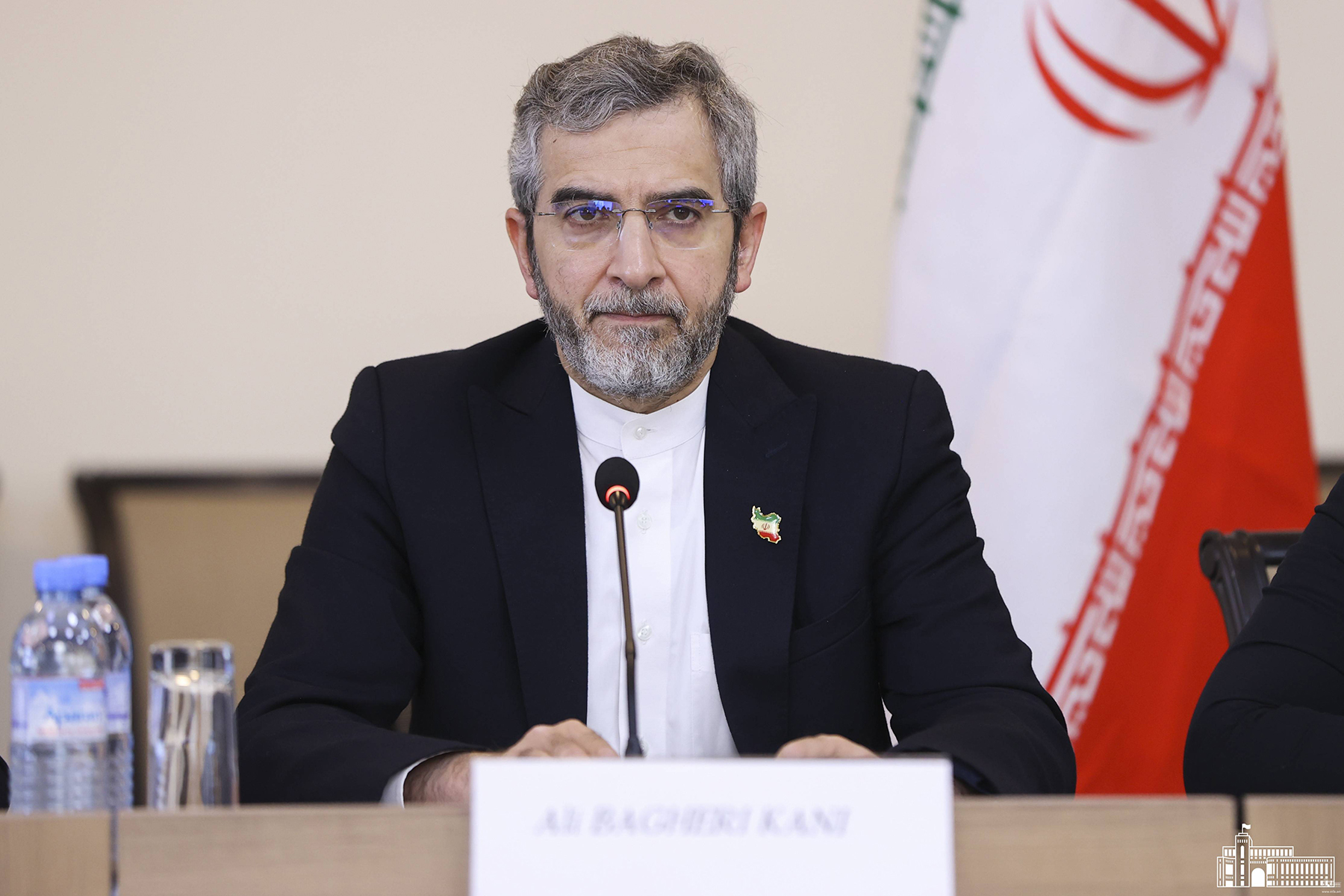
Growing tensions between Armenia and Azerbaijan and in Nagorno-Karabakh have led to fears that a new escalation, or full-scale war, may be inevitable.
Tensions have been on the rise since a deadly clash on 5 March between Nagorno-Karabakh police officers and Azerbaijani troops near the Lachin corridor, which has been blocked for over three months.
Since then, both Armenia and Nagorno-Karabakh have regularly accused Azerbaijan of violating the ceasefire, including reports of civilians in Nagorno-Karabakh coming under fire.
On Wednesday, the Armenian Defence Ministry said a soldier was killed on the border with Nakhchivan, just south of Yerevan.
Baku has also accused Yerevan and Stepanakert of multiple ceasefire violations; on 20 March they said that an Azerbaijani soldier was wounded on the Armenian border in the south.
Azerbaijan has also accused Russian peacekeepers of escorting Armenian troops and arms to Nagorno-Karabakh, with Armenia denying the reports and Russia reporting only about humanitarian vehicles passing through the Lachin corridor.
Tensions at the border have been accompanied by hostile rhetoric in Baku. During a Nowruz event last week, President Ilham Aliyev said that if Armenians wished to ‘live comfortably in an area of 29,000 square kilometres’ — the size of Armenia — they must recognise Azerbaijan’s borders and sign a peace deal ‘according to our conditions’.

‘If Armenia does not recognise our territorial integrity, we will not recognise their territorial integrity either’, he said.
Such comments have led to widespread fears in Armenia that Azerbaijan was laying the grounds for an attack on Nagorno-Karabakh or Armenia itself.
Tigran Grigoryan, a Yerevan-based political analyst and the head of the Regional Centre for Democracy and Security, warned that a new escalation was now likely.
‘The trend is that every time, [Azerbaijan] are trying to increase the scale of the tension to see what is the international reaction’, Grigoryan told OC Media, adding that Azerbaijan also wanted to test Russia’s ‘red lines’.
The Azerbaijani incursion into Armenia in September 2022 came to an end after unprecedented international criticism aimed specifically at Azerbaijan.
Grigoryan said Azerbaijani aims in a new escalation might be to force Armenia and Nagorno-Karabakh to accept Azerbaijan’s terms, as peace talks remained ‘at an impasse’.
[Listen on the Caucasus Digest: A looming conflict in Nagorno-Karabakh and newborn trafficking in Georgia]
Officials in Armenia have also raised the alarm. Speaking in parliament on Wednesday, Foreign Minister Ararat Mirzoyan said the current rhetoric coming from Baku suggested a heightened risk of escalation.
‘There’s always a risk of aggression regardless of the negotiations and Armenia’s constructive approach during the negotiations’, he said.
Mirzoyan added that if war broke out in Nagorno-Karabakh, the region’s Armenian population was at risk of ethnic cleansing.
Laying the groundwork
Azerbaijani officials and pro-government figures have also poured fuel on the fire.
Following Aliyev’s Novuruz comments, several officials posted similar statements online, stating that Armenia must ‘reciprocate Azerbaijan’s peace proposals’ to be allowed to live in its internationally recognised borders.
Several also switched to using the Armenian name for Armenia — Hayastan — in an apparent attempt to insult Armenia.
Commenting on the situation earlier in March, Azerbaijani writer and activist Samad Shikhi said that the government was attempting to create a pretext for military action by painting the other side as being unwilling to negotiate.
He said the government and pro-government media were already trying to ‘create support for [military action] in society’.
‘It is the state and its propaganda that shape the people’s thinking’, Shikhi wrote. ‘There is only one institution (the government) that creates and manages ideas in Azerbaijan.’
‘The Presidential Administration has tried to publish this kind of information in the media as much as possible, and tried to make it visible to everyone’, he added.
A ‘security guarantor’
If a new outbreak of hostilities were to occur, it is unclear what the international response might be.
Russia, Armenia’s traditional ally, has grown increasingly estranged from the Armenian government.
Speaking on 16 March, Armenian Prime Minister Nikol Pashinyan repeated a claim that Russia was Nagorno-Karabakh’s ‘security guarantor’ as per the 2020 ceasefire agreement that ended the Second Nagorno-Karabakh War. The agreement saw the deployment of Russian peacekeepers to the region.
Pashinyan also urged Russia to apply to the UN Security Council to take measures to protect the Armenians of Nagorno-Karabakh if their peacekeepers were ‘unable’ to do so.
Russian Foreign Ministry Spokesperson Maria Zakharova dismissed his claims, stating that ‘there is no mention of Russian guarantees regarding Karabakh’ in the agreement, and that calls for the security council to intervene were a ‘miraculous ride’.
Azerbaijani official rhetoric has also grown increasingly hostile towards Russia. Since early March, Baku has frequently accused Moscow of escorting Armenian military vehicles and troops to Nagorno-Karabakh bypassing the blockaded Lachin corridor.
There has also been growing speculation about Tehran’s potential role in any renewed hostilities.
On Wednesday, Iranian Deputy Foreign Minister, Ali Bagheri Kani, met with the Secretary of Armenia’s National Security Council, Armen Grigoryan, in Yerevan. According to Armenia, they discussed ‘regional security’ and the situation on the Armenia-Azerbaijan border and in Nagorno-Karabakh.

Iran has grown more supportive of Armenia since the Second Nagorno-Karabakh War.
The country has previously stated that it would not allow Azerbaijan to threaten its shared border with Armenia. One of Azerbaijan’s demands to Armenia has been a corridor through southern Armenia connecting the west of Azerbaijan with the exclave of Nakhchivan.
Kani’s visit came as tensions between Azerbaijan and Iran continue to flare.
On 10 March, during a visit to Baku by Israeli Intelligence Minister Gila Gamliel, Azerbaijan accused Iran of violating the country’s airspace. They said a military plane flew along the border around areas in the south that Azerbaijan took control of in 2020, crossing into Azerbaijan and back.








